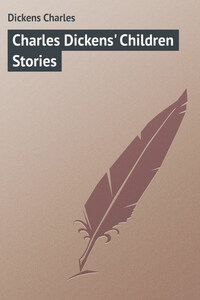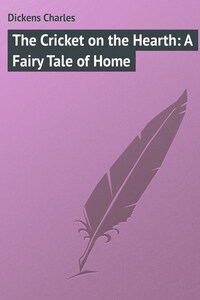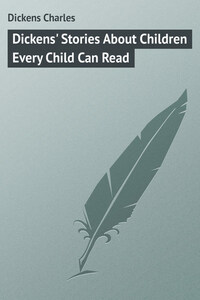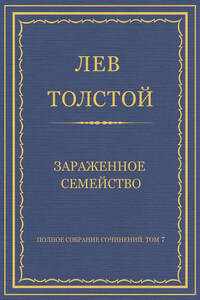TROTTY VECK AND HIS DAUGHTER MEG
"TROTTY" seems a strange name for an old man, but it was given to Toby Veck because of his always going at a trot to do his errands; for he was a porter, and carried letters and messages for people who were in too great a hurry to send them by the post. He did not earn very much, and had to be out in all weathers and all day long. But Toby was of a cheerful disposition, and looked on the bright side of everything. His greatest joy was his dear daughter Meg, who loved him dearly.
One cold day Toby had been trotting up and down in his usual place before the church, when the bells chimed twelve o'clock, which made Toby think of dinner.
"There's nothing," he remarked, "more regular in coming round than dinner-time, and nothing less regular in coming round than dinner. That's the great difference between 'em." He went on talking to himself never noticing who was coming near to him.
"Why, father, father," said a pleasant voice, and Toby turned to find his daughter's sweet, bright eyes close to his.
"Why, pet," said he, kissing her, "what's-to-do? I didn't expect you to-day, Meg."
"Neither did I expect to come, father," said Meg, smiling. "But here I am! And not alone, not alone!"
"Why, you don't mean to say," observed Trotty, looking curiously at the covered basket she carried, "that you? – "
"Smell it, father dear," said Meg; "only smell it, and guess what it is."
Toby took the shortest possible sniff at the edge of the basket. "Why, it's hot," he said.
But to Meg's great delight he could not guess what it was that smelt so good. At last he exclaimed in triumph, "Why, what am I a-thinking of? It's tripe!"
And it was.
Just as Toby was about to sit down to his dinner on the doorsteps of a big house close by, the chimes rang out again, and Toby took off his hat and said, "Amen."
"Amen to the bells, father?"
"They broke in like a grace, my dear," said Trotty, "they'd say a good one if they could, I'm sure. Many's the kind thing they say to me. How often have I heard them bells say, 'Toby Veck, Toby Veck, keep a good heart, Toby!' A millions times? More!"
"Well, I never!" cried Meg.
While Toby ate his unexpected dinner with immense relish, Meg told him how her lover Richard, a young blacksmith, had brought his dinner to share with her, and had begged her to marry him on New Year's Day, "the best and happiest day of the whole year."
"So," went on Meg, "I wanted to make this a sort of holiday to you, as well as a dear and happy day to me, father, and I made a little treat and brought it to surprise you."
Just then, Richard himself came up to persuade Toby to agree to their plan; and almost at the same moment, a footman came out of the house and ordered them all off the steps, and some gentleman came out who called up Trotty, and gave him a letter to carry.
Toby trotted off to a very grand house, where he was told to take the letter in to the gentleman. While he was waiting, he heard the letter read. It was from Alderman Cute, to tell Sir Joseph Bowley that one of his tenants named Will Fern who had come to London to try and get work, had been brought before him charged with sleeping in a shed, and asking if Sir Joseph wished him to be dealt leniently with or otherwise. To Toby's great disappointment the answer was given that Will Fern might be sent to prison as a vagabond, though his only fault was poverty. On his way home, Toby ran against a man dressed like a countryman, carrying a fair-haired little girl. The man asked him the way to Alderman Cute's house.
"It's impossible," cried Toby, "that your name is Will Fern?"
"That's my name," said the man.
Thereupon Toby told him what he had just heard, and said "Don't go there."
Poor Will told him how he could not make a living in the country, and had come to London with his orphan niece to try and find a friend of her mother's and to endeavor to get some work, and wishing Toby a happy New Year, was about to trudge wearily off again, when Trotty caught his hand saying —
"Stay! The New Year never can be happy to me if I see the child and you go wandering away without a shelter for your heads. Come home with me. I'm a poor man, living in a poor place, but I can give you lodging for one night and never miss it," and lifting up the pretty little one, he trotted towards home, and rushing in, he set the child down before his daughter. The little girl ran into her arms at once, while Trotty ran round the room, saying, "Here we are and here we go. Here, Uncle Will, come to the fire. Meg, my precious darling, where's the kettle? Here it is and here it goes, and it'll bile in no time!"
"Why, father!" said Meg, "you're crazy to-night, I think. Poor little feet, how cold they are!"
"Oh, they're warmer now!" exclaimed the child. "They're quite warm now!"
"No, no, no," said Meg. "We haven't rubbed 'em half enough. And when they're done, we'll brush out the damp hair; and we'll bring some color to the poor pale face with fresh water; and then we'll be so gay and brisk and happy!"
The child sobbing, clasped her round the neck, saying, "O Meg, O dear Meg!"












